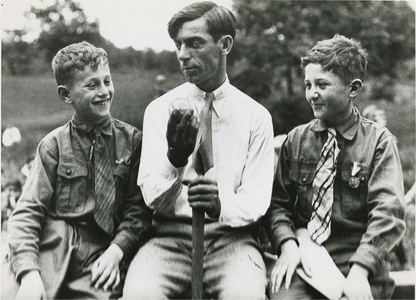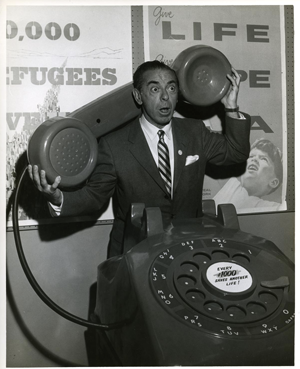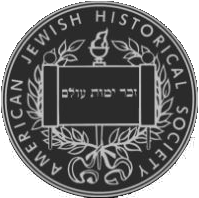Historian David Weinstein used many of AJHS’ collections in his research on Jewish performer and comedian, Eddie Cantor, including correspondence regarding Cantor’s efforts to combat anti-Semitism in the 1930s and 40s.
While conducting archival research at AJHS in December 2013, I stumbled onto a seventy-one-year-old letter that made me very happy. I was on a whirlwind research trip for my book about the Jewish entertainer, Eddie Cantor. The AJHS’s online finding aid for the papers of Milton Weill, a Jewish businessman and philanthropist, referenced correspondence between Cantor and Weill, the then-chairman of the public relations committee of the Jewish Welfare Board.

Starting in the mid-1930s Cantor used his platform to combat anti-Semitism and Nazism. He raised thousands of dollars for Hadassah and Youth Aliyah to facilitate young German Jews’ flight from Nazi Germany to Palestine.
By the time of my research trip, I had already reviewed a treasure trove of AJHS’ Hadassah and Youth Aliyah records documenting Cantor’s fundraising efforts. In his fiery speeches to Hadassah members, Cantor warned of the dangers of domestic anti-Semitism, and condemned figures such as Henry Ford and Father Charles Coughlin.
In this time, Cantor was one of America’s biggest radio stars. However, he was fired in June 1939 as a result of his political activism, particularly his outspoken stance against Nazi Germany. This jeopardized his career, and served as a cautionary tale for other prominent Jews looking to speak out against Nazism.
As Cantor remolded his image to get back on the air, he shifted his rhetorical strategies: he spoke less about threats facing Jews in America and Europe, and instead, he extolled the value of religious freedom and tolerance, while joining interfaith coalitions fighting prejudice, Nazism, and communism. This softer approach helped Cantor revitalize his career, and he made his triumphant return to radio in 1940.
After Pearl Harbor, he worked tirelessly to support the war effort by performing for the troops, visiting military hospitals, conducting war bonds drives, and partnering with the American Legion to collect Christmas gifts for soldiers.

In his public statements, Cantor did not link this patriotic activity with his Jewish identity, nor with any specifically Jewish causes. However, Cantor was able to be candid in his private correspondences. In a letter to Weill from December 1942, Cantor wrote of his belief that open Jewish support of the government and military helped to defuse domestic anti-Semitism. In discussing how to counter anti-Semitic “jokes” in the armed forces, for example, Cantor recommended that Weill highlight trips to entertain troops by his fellow Jewish entertainers Al Jolson and Jack Benny. He also pointed to his own work, and his volunteer work wrapping Christmas gifts for soldiers with his wife, Ida. This was, he wrote, the “propaganda we need to off-set the unfavorable jokes about us.”
Cantor ended his letter with a request to Weill, in which Cantor asked him to speak with the sponsor of the non-Jewish comedian, Fred Allen. Cantor explained that “there are very few programs on which Fred Allen doesn’t, without thinking, take a crack at the Jews.” Cantor cited a sketch from the previous week’s Fred Allen program, which I hunted down after reading the letter. Sure enough, Allen ends his program with a routine featuring a Yiddish-accented Jewish salesman in a cut-rate, downtown clothing store. Cantor may have been especially angry that Allen, a non-Jewish performer, was stealing a sketch, known as “Joe’s Blue Front,” that Cantor made famous on the Broadway stage in the 1920s. The routine was no longer part of Cantor’s repertoire in 1943. Given the environment in America and the world, images of fast-talking, aggressive Jews selling cheap clothes no longer amused Cantor.

